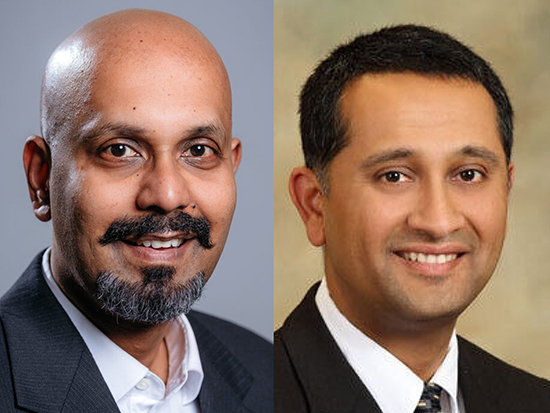 The grant will explore ways to employ artificial intelligence with telehealth in rural, underserved areas of the South.Two faculty in the School of Health Professions at the University of Alabama at Birmingham have been awarded an R01 grant from the National Institute of Diabetes and Digestive and Kidney Diseases to employ telehealth technologies to combat diabetes in rural, underserved areas.
The grant will explore ways to employ artificial intelligence with telehealth in rural, underserved areas of the South.Two faculty in the School of Health Professions at the University of Alabama at Birmingham have been awarded an R01 grant from the National Institute of Diabetes and Digestive and Kidney Diseases to employ telehealth technologies to combat diabetes in rural, underserved areas.
The grant, awarded to Mohanraj Thirumalai, Ph.D., assistant professor, and Tapan Mehta, Ph.D., associate professor in the Department of Health Services Administration, will be used to develop an automated conversational behavior monitoring and counseling program for diabetes-related health behaviors.
The project, called GODART, or Gamified Optimized Diabetes management with Artificial Intelligence-powered Rural Telehealth, will use natural language-understanding technology combined with gamification to reach target communities in Alabama and other Deep South states with high rates of diabetes. This intervention uses several new techniques such as daily automated diabetes-related behavior monitoring, rewards for consistency in behavior monitoring and artificial intelligence-powered health coaching calls.
“An Alabamian has about a one-third more chance to be diagnosed with diabetes as compared to the United States average,” Thirumalai said. “This is not surprising as the penetration rate of the CDC’s Diabetes Prevention Program is 70 percent less in rural counties across America in comparison to urban counties.”
Thirumalai is an informatician building advanced artificial intelligence-backed technologies that can be delivered using a smart or non-smart telephone.
“In my 20 years of experience building and delivering telehealth interventions, one size definitely does not fit all,” he said. “There is a clear need to use cutting-edge technologies to build scalable and sustainable interventions but be cognizant that rural Alabama is major victim to the digital divide.”
 Mohanraj Thirumalai, Ph.D., and Tapan Mehta, Ph.D., Department of Health Services Administration, School of Health ProfessionsThirumalai and Mehta say there are substantial disparities in diabetes-related outcomes associated with suboptimal social determinants of health, such as access to health services, in vulnerable populations within Alabama and rest of the Deep South. Rates of diabetes and cardiometabolic diseases are highest in the Deep South, they say.
Mohanraj Thirumalai, Ph.D., and Tapan Mehta, Ph.D., Department of Health Services Administration, School of Health ProfessionsThirumalai and Mehta say there are substantial disparities in diabetes-related outcomes associated with suboptimal social determinants of health, such as access to health services, in vulnerable populations within Alabama and rest of the Deep South. Rates of diabetes and cardiometabolic diseases are highest in the Deep South, they say.
“What is concerning further is the declining rate of diabetes management in the U.S., which has dropped from 57 percent in 2010 to 51 percent in 2018,” Mehta said. “Leveraging scalable artificial intelligence-backed technologies to develop financially sustainable interventions that influence suboptimal social determinants of health is a key next step in improving diabetes management in the Deep South. This study provides an opportunity to develop an optimized scalable intervention package that health systems could leverage to address diabetes and health equity simultaneously.”
Mehta is a health services researcher with expertise in advanced research design methodologies studying practice transformation and population health management initiatives in primary care settings.
“An intervention needs to be rigorously evaluated to systematically understand what aspects of the intervention work and do not work for it to be an effective and meaningful health services solution,” Mehta said. “We will be using the multiphase optimization strategy, a resource-efficient approach for developing the proposed gamified telehealth intervention and enabling systematic continuous improvement.”
Thirumalai and Mehta are collaborating with two faculty members in the UAB School of Medicine: Andrea Cherrington, M.D., associate professor and obesity researcher in the Division of Preventive Medicine; and Amanda Willig, Ph.D., R.D., associate professor in the Division of Infectious Medicine.